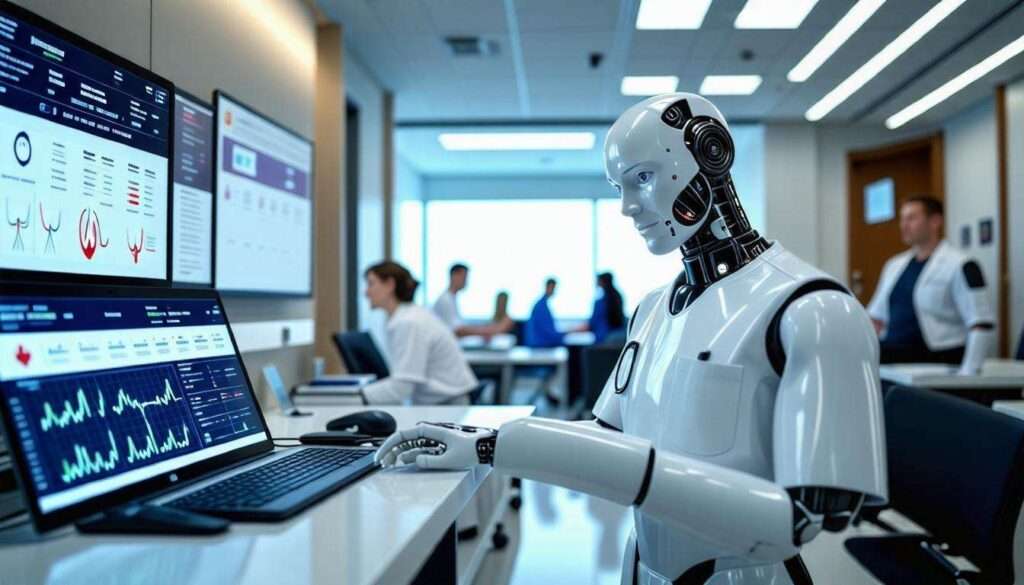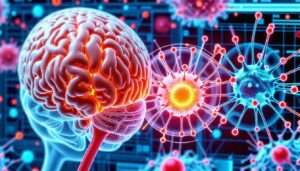Artificial Intelligence (AI) is transforming healthcare in extraordinary ways. Imagine a robot guiding a surgeon during a delicate operation or an app reminding you to take your medication—these innovations showcase how AI enhances patient care and speeds up disease diagnosis.
In this story, we will explore seven tangible applications of AI in healthcare. From fast-tracking drug discovery to personalizing treatment plans, AI is redefining our health and wellness journey. Let’s look at how these groundbreaking technologies are reshaping the healthcare place!
Key Takeaways
- AI transforms healthcare, enhancing diagnostic accuracy and personalizing treatment strategies.
- Its influence is evident in AI-powered robotic surgeries, state-of-the-art medical imaging, and virtual nursing assistance.
- AI streamlines administrative tasks and improves patient data management through electronic health records (EHRs).
- Adopting AI speeds up diagnoses and enriches the in general patient experience.
Improving Medical Diagnosis
What if diagnosing a disease was as quick as sending a text?
Artificial Intelligence (AI) is turning that vision into reality! By leveraging advanced technologies like machine learning and natural language processing, AI equips doctors to provide faster and more accurate diagnoses. Each year, around 400,000 hospitalized patients experience preventable harm because of human errors. Here, AI shines—acting as a super-smart assistant that never misses a detail.
AI can analyze vast data sets in seconds, connecting dots that human minds might overlook. For example, it can examine medical images, identifying patterns in X-rays or MRIs that indicate health issues. This leads to quicker treatments and shorter waiting times for patients. Think of AI as a detective who uncovers clues faster than anyone else—that’s its power!
Plus, AI revolutionizes personalized treatments by tailoring healthcare to individual patient data, transforming complex processes into seamless experiences for both patients and providers. This marks a significant shift in our approach to medical care.
- Faster Diagnoses: AI processes data rapidly, cutting down wait times.
- Improved Accuracy: AI identifies patterns in medical images with greater precision than humans.
- Personalized Care: AI customizes treatments to fit individual patient needs.
Speeding Up Drug Discovery
Finding a needle in a haystack perfectly illustrates the traditional drug discovery process—arduous and slow. Enter artificial intelligence (AI), our intelligent ally that swiftly navigates vast data landscapes to uncover effective treatments. AI empowers researchers to design groundbreaking drugs, predict side effects, and identify the best candidates for clinical trials—all at lightning speed.
Did you know that developing a single drug can cost around $1.3 billion?
AI is transforming this place by drastically cutting both time and costs. Imagine AI as a treasure map, revealing hidden connections in genetic codes that lead to medical breakthroughs!
By automating repetitive tasks, AI allows healthcare professionals to focus on what truly matters: patient care. Its ability to analyze and connect extensive data enables quicker diagnoses and personalized treatments. This not only boosts efficiency but also enriches the healthcare experience for everyone involved.
| AI Application | Benefit |
|---|---|
| Drug Design | Speeds up development |
| Predicting Side Effects | Reduces trial and error |
| Clinical Trials | Identifies ideal candidates |
Transforming Patient Experience
Imagine entering a hospital where everything operates like a well-rehearsed symphony. This is the power to transform of artificial intelligence (AI) in healthcare. AI streamlines processes for patients, doctors, and administrators, executing tasks faster and more cost-effectively than ever before. Think of AI as a brilliant assistant, enabling doctors to deliver quicker, more accurate diagnoses.
AI analyzes vast data sets to reveal patterns, much like a detective piecing together clues. Each year, around 400,000 hospitalized patients suffer preventable harm. By predicting and diagnosing diseases swiftly, AI can drastically reduce this number—like having a superhero on your healthcare team!
Also, AI enhances the patient experience by automating tasks such as appointment scheduling and reminders. This shift frees healthcare providers to focus more on patient care rather than administrative burdens. With AI, we can expect personalized treatments tailored to individual needs, transforming healthcare into a meaningful conversation rather than a mere transaction.
In drug development, AI speeds up the process, assisting in drug design and predicting side effects. This means patients can access new treatments faster. In general, AI is revolutionizing healthcare, ensuring timely and effective care while simplifying life for healthcare professionals.
Managing Healthcare Data
Managing healthcare data resembles organizing a vast library of millions of books, each chronicling a patient’s journey, treatment, and progress. With artificial intelligence (AI), we can swiftly pinpoint the right information, much like a librarian wielding an advanced catalog system.
AI reshapes the roles of patients, doctors, and hospital administrators, performing tasks faster and more cost-effectively than humans. Imagine AI as a super-smart assistant that analyzes extensive data sets to predict health trends, empowering doctors to make quicker, more accurate diagnoses.
Also, AI simplifies the management of electronic health records (EHRs), enabling healthcare professionals to access patient information with ease. This efficiency translates to less time hunting for data and more time focused on patient care. With AI, we bolster data security, protecting patient privacy like a sturdy lock on a treasure chest.
AI is transforming healthcare data management, enhancing patient outcomes and fostering more efficient healthcare systems.
Performing Robotic Surgery
Imagine a surgeon at a console, skillfully guiding a robot’s arms like a conductor leading an orchestra. This is the heart of robotic surgery, where AI enhances human expertise. Equipped with a three-dimensional view of the surgical field, these robots help reduce complications, minimize pain, and accelerate recovery for patients.
How does it work?
Think of AI as a brilliant assistant, learning from countless surgeries. By analyzing data from thousands of procedures, AI enables surgeons to make well-informed choices. It’s like having a vast library of knowledge at your fingertips, finding your way complex tasks with ease. This technology remarkably reduces human error, critical when considering that around 400,000 patients face preventable harm each year.
As we accept these advancements, we anticipate not just improved patient outcomes but a transformative shift in healthcare. Robotic surgery is not merely a trend; it signifies a future where technology and human skill merge seamlessly.
| Benefits of Robotic Surgery | Impact on Patients |
|---|---|
| Enhanced precision | Fewer complications |
| Minimally invasive techniques | Reduced recovery time |
| Real-time data analysis | Improved surgical outcomes |
Enhancing Telemedicine Capabilities
Imagine a world where doctors diagnose illnesses faster than a speeding bullet, all thanks to artificial intelligence (AI). Think of AI as a super-smart assistant, streamlining tasks that usually eat up precious time. It can analyze mountains of patient data in seconds, revealing patterns that might take humans days to spot. This swift analysis allows doctors to make quicker, more accurate diagnoses, in the end saving lives.
But how does this transformation happen?
AI uses techniques like machine learning and natural language processing. Picture it as teaching a robot to understand human language and learn from experience, just like we do in school. With AI, healthcare providers can automate tasks such as scheduling appointments and sending reminders, creating a seamless experience for everyone.
AI also supercharges telemedicine capabilities. It enables patients to consult with doctors virtually, breaking down geographical barriers. Imagine seeing a doctor from the comfort of your home, like chatting with a friend online. This not only makes healthcare more accessible but also ensures timely advice and treatment.
- Faster Diagnoses: AI swiftly analyzes data, helping doctors identify conditions sooner.
- Improved Accessibility: AI-driven telemedicine connects patients with healthcare providers remotely.
- Personalized Care: AI crafts tailored treatment plans based on individual patient data.
As AI continues to evolve, it will transform healthcare into a more efficient, accessible, and patient-centered system. Are you ready to accept this thrilling future?
Utilizing Predictive Analytics for Patient Monitoring
Picture a superhero in the hospital—one that instantly analyzes mountains of data! That’s the magic of predictive analytics in patient monitoring. By leveraging artificial intelligence (AI), we can foresee health issues before they spiral out of control. Think of it as a health weather forecast: just as meteorologists predict storms, AI anticipates potential health crises.
By scrutinizing real-time data, healthcare providers can spot trends and respond swiftly. For instance, if a patient’s heart rate suddenly spikes, AI can alert doctors faster than any human could. This proactive approach can save lives, especially for those with chronic conditions—like having a tireless personal health assistant!
Key benefits of predictive analytics include:
- Early Detection: Identifying risks before they escalate.
- Personalized Care: Tailoring treatment plans to individual needs.
- Cost Efficiency: Reducing unnecessary hospital visits and treatments.
In a place where every next counts, accepting predictive analytics in healthcare isn’t just smart; it’s necessary for enhancing patient outcomes!
Summing up
AI is revolutionizing healthcare, reshaping how we approach patient treatment and health management. Imagine having a crystal ball that not only detects health issues early but also crafts personalized treatment plans tailored just for you. This technology empowers doctors to make well-informed choices, remarkably enhancing patient care. For example, AI can rapidly analyze medical images, pinpointing diseases with astonishing speed. By harnessing AI’s potential, we can expect improved healthcare outcomes for everyone. Accepting these innovations opens the door to a healthier future.




